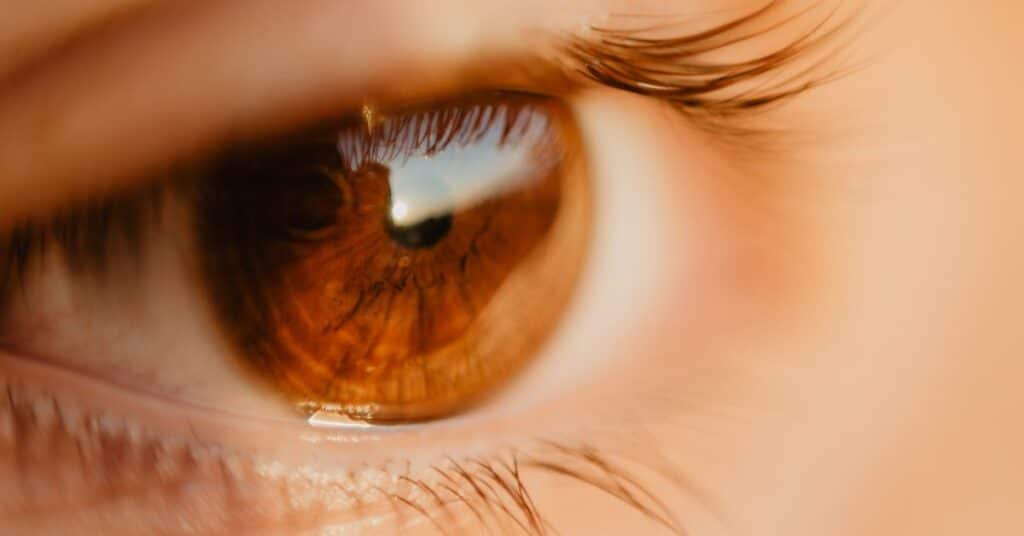By evening, do your eyes feel like they’ve run a marathon? The blurry vision, dryness, eye strain, nagging ache it’s a daily struggles so many of us endure but rarely stop to address. We blame it on “just another long day,” but here’s the truth: your eyes are silently battling. Today’s life strains your vision with back-to-back Zoom meetings, endless scrolling on your phone, and the glare of fluorescent lights.
What if there is a natural way to protect your vision, reduce eye strain, and keep your eyes healthy for years to come? No complicated routines, no harsh chemicals just a solution from nature itself. Let me introduce you to Krill, a tiny ocean organism with a powerful secret: astaxanthin when it comes to vision support.
The magic of krill lies in astaxanthin, often nicknamed the “king of antioxidants.” It’s one of nature’s most potent protectors for your eyes. It targets the root causes of eye fatigue, dryness, and even age-related vision issues like macular degeneration. It shields your eyes from the oxidative damage caused by blue light, pollution, and everyday strain.
But how exactly does astaxanthin work, and why is it so effective? Curious to know? Let’s uncover the incredible benefits of this nutrient and how it can help you protect, nourish, and improve your vision in ways you never thought possible.
Astaxanthin: Why Does It Matter For Eye Health?
Astaxanthin is a natural pigment (a carotenoid) that gives salmon, shrimp, and krill their characteristic reddish hue. But its value extends far beyond aesthetics especially when it comes to your eyes. Astaxanthin is one of the most powerful antioxidants on the planet, with studies showing it’s up to 6,000 times more potent than vitamin C at neutralizing harmful free radicals that contribute to oxidative damage.
What makes astaxanthin particularly remarkable for eye health is its ability to cross the blood-retinal barrier, allowing it to target the delicate tissues of your eyes directly. Once there, it works to reduce oxidative stress, improve circulation, and protect against degenerative conditions such as macular degeneration and cataracts. By combating these issues at the source, astaxanthin has emerged as a standout natural remedy for promoting long-term vision health and maintaining clear, sharp eyesight.
Whether you’re looking to prevent age-related vision decline or simply keep your eyes in optimal condition, astaxanthin provides targeted support that’s hard to beat.
Why Krill Is the Best Source of Astaxanthin
While astaxanthin can be found in algae, salmon, and shrimp, krill provides the most bioavailable and effective form. This is because the astaxanthin in krill is bound to phospholipids, making it easier for your body to absorb and utilize.
Krill delivers consistent, long-lasting benefits for eye health. Unlike some sources of astaxanthin that lose potency during digestion, the phospholipid-bound astaxanthin in krill ensures steady absorption over time. This makes krill especially valuable for today’s challenges like prolonged screen exposure and environmental stress, ensuring hydration and reducing eye strain over time
Krill also contains essential omega-3 fatty acids, like EPA and DHA, which work synergistically with astaxanthin to reduce inflammation, repair cell damage, and support overall eye health. Omega-3s help maintain the integrity of the retina and prevent dryness, making krill a comprehensive solution for vision protection.
12 Surprising Ways Astaxanthin In Krill Supports Eye Health
Astaxanthin’s benefits go far beyond reducing oxidative stress especially when delivered through krill, which provides a uniquely bioavailable source of this powerful antioxidant. Here’s how it supports your vision in ways you might not expect:

Shields the Retina From Oxidative Stress
The retina is bombarded by oxidative stress caused by light exposure, pollution, and environmental factors. Left unchecked, this stress can damage cells and lead to conditions like macular degeneration.
How it helps:
The phospholipid-bound astaxanthin in krill neutralizes free radicals in the retina, preventing cellular damage. It penetrates deep into the eye, delivering targeted protection.
Fact: A study in Marine Drugs found astaxanthin’s effectiveness in managing age-related macular degeneration (AMD), cataracts, and diabetic retinopathy.
Reduces Inflammation in Eye Tissues
Chronic inflammation silently undermines eye health, contributing to conditions like AMD, dry eye syndrome, and diabetic retinopathy.
How it helps:
Astaxanthin in krill reduces swelling and irritation with its anti-inflammatory properties, protecting delicate blood vessels and retinal cells.
Benefit: Relief from redness, dryness, and inflammation-driven vision decline, especially for those with dry eye syndrome.
Enhances Retinal Blood Flow
The retina depends on robust blood flow for oxygen and nutrients. Poor circulation can weaken retinal health and lead to vision problems.
How it helps:
Krill’s unique combination of astaxanthin and omega-3 fatty acids (EPA and DHA) improves microcirculation in the retina, strengthening capillaries and ensuring nutrients reach where they’re needed most.
Result: Sharper, healthier vision and a reduced risk of retina-related complications.
Protects Against Blue Light Damage
Blue light from screens and LED lighting penetrates deep into the retina, accelerating oxidative stress and eye fatigue.
How it helps:
Astaxanthin in krill acts as a natural shield, absorbing harmful wavelengths and reducing oxidative damage caused by blue light exposure.
Pro tip: This protection is especially beneficial for anyone spending extended hours on digital devices.
Improves Night Vision
Difficulty seeing in dim light often arises from photoreceptor damage in the retina. This issue worsens with age, making night driving and low-light environments challenging.
How it helps:
Astaxanthin in krill supports and protects photoreceptor cells, enhancing their function and preserving clarity in low-light settings.
Result: Safer night driving and sharper vision in dark environments.
Eases Digital Eye Strain
Hours of screen use strain the ciliary muscles, causing fatigue, discomfort, and blurred vision.
How it helps:
Astaxanthin in krill improves muscle flexibility and focus, reducing strain and helping eyes recover faster after screen use.
Study-backed: Clinical research shows that astaxanthin can reduce symptoms of eye fatigue.
Slows Age-Related Vision Decline
Aging increases oxidative stress and inflammation, heightening the risk of AMD, cataracts, and glaucoma.
How it helps:
By addressing the root causes of age-related vision loss, the astaxanthin in krill slows the progression of these conditions, protecting retinal cells and enhancing circulation.
Statistic: According to the National Eye Institute, over 11 million Americans suffer from AMD. Astaxanthin offers an effective preventative solution.
Relieves Chronic Dry Eye
Dry eye syndrome, characterized by burning and itching, affects millions of people, especially those in arid environments or exposed to air conditioning.
How it helps:
The astaxanthin in krill stimulates tear production and reduces inflammation in the tear glands, keeping eyes hydrated and comfortable.
Result: Long-lasting relief from dryness and irritation.
Supports Recovery From Eye Surgery
Post-surgical recovery from procedures like LASIK or cataract surgery can involve swelling, oxidative stress, and discomfort.
How it helps:
Krill’s astaxanthin accelerates healing by reducing inflammation and oxidative stress, ensuring a smoother recovery process.
Prevents Glaucoma Progression
Glaucoma, caused by high intraocular pressure, can damage the optic nerve and lead to irreversible vision loss.
How it helps:
Astaxanthin in krill reduces oxidative stress in the optic nerve and improves blood flow, potentially slowing glaucoma progression.
Fact: Studies suggest astaxanthin may protect against optic nerve damage, a key factor in managing glaucoma.
Shields Against UV Damage
UV rays aren’t just harmful to your skin they also accelerate eye aging and increase the risk of cataracts.
How it helps:
Krill’s astaxanthin acts like sunscreen for your eyes, providing a natural defense against UV-induced damage and maintaining lens clarity.
Why it matters: Outdoor enthusiasts, this one’s for you whether hiking, skiing, or sunbathing, your eyes stay protected.
Combats Surfer’s Eye (Pterygium)
Prolonged exposure to wind, dust, and UV rays can cause pterygium, a growth on the eye’s surface that impairs vision.
How it helps:
The astaxanthin and omega-3s in krill work together to reduce inflammation and UV damage lowering the risk of this condition, particularly for those frequently outdoors.
Incorporating Krill and Astaxanthin Into Your Daily Routine
If you’re looking to protect your eyes and enhance your vision, adding krill to your diet is an easy and effective solution.
Introduce Krill Meat to Your Meals
Krill meat is a versatile and nutrient-rich seafood option. Packed with omega-3s, astaxanthin, and high-quality protein, it can be incorporated into a variety of dishes while providing direct support for your eye health.
Why it works: The nutrients in krill meat help protect your retina, combat dryness, and reduce oxidative damage caused by environmental stressors and aging.
How to enjoy it:
- Cook krill meat similarly to shrimp steam, stir-fry, or add it to soups and stews.
- Toss it into a salad or pasta for a seafood twist that’s both healthy and flavorful.
Pro tip: If fresh krill meat isn’t available, look for sustainably sourced frozen or canned options.
Krill Oil Supplements
While krill meat is an excellent natural source of eye-supporting nutrients, supplements provide a concentrated dose of omega-3 fatty acids and astaxanthin, ensuring consistent daily intake.
Why it’s effective:
- Supplements offer targeted support for issues like digital eye strain, dryness, and inflammation.
- Krill meat provides additional vitamins and antioxidants that complement supplementation, offering a well-rounded approach.
How to incorporate: Take krill oil supplements daily to maximize benefits.
Pair Krill With Vision-Supportive Foods
Boost the effectiveness of krill by combining it with other foods that promote eye health. Examples include:
- Leafy greens (spinach, kale): Contain lutein and zeaxanthin, which complement astaxanthin in protecting your retina.
- Bright-colored vegetables (carrots, sweet potatoes): Rich in beta-carotene, essential for night vision.
- Citrus fruits and berries: Loaded with vitamin C to combat oxidative damage.
Meal inspiration: Create a krill salad with spinach, orange slices, and a light vinaigrette for a nutrient-packed dish.
Use Krill Oil in Cooking
Liquid krill oil is a versatile addition to your kitchen and can be used as a finishing oil to add nutrients to meals.
Ideas to try:
- Drizzle it over roasted vegetables or grilled fish.
- Blend it into homemade salad dressings or dips for a subtle seafood flavor.
Why it helps: Cooking with krill oil ensures a steady intake of omega-3s and astaxanthin without needing to adjust your routine significantly.
Pro Tips for Maximum Results:
- Take with meals: Astaxanthin is fat-soluble, so it absorbs better when consumed with healthy fats.
- Stay consistent: Results take time, so aim for at least 4-6 weeks of daily use to notice significant improvements.
Final Thoughts: Protect Your Vision Naturally
Your eyes deserve the best. So, why let your eyes suffer the daily grind when nature has already provided a solution? Krill has a powerful combination of antioxidant astaxanthin and omega-3s, which offers a natural, effective way to protect and enhance your vision. From fighting oxidative stress to reducing inflammation, improving depth perception, and even supporting recovery after surgery, astaxanthin provides an incredible array of benefits for your eyes.
Your vision is irreplaceable so why not give it the care it deserves? By incorporating krill into your routine, you’re taking a proactive step toward maintaining clear, healthy eyes in a world full of visual demands. With astaxanthin on your side, the future of your vision truly looks bright.








